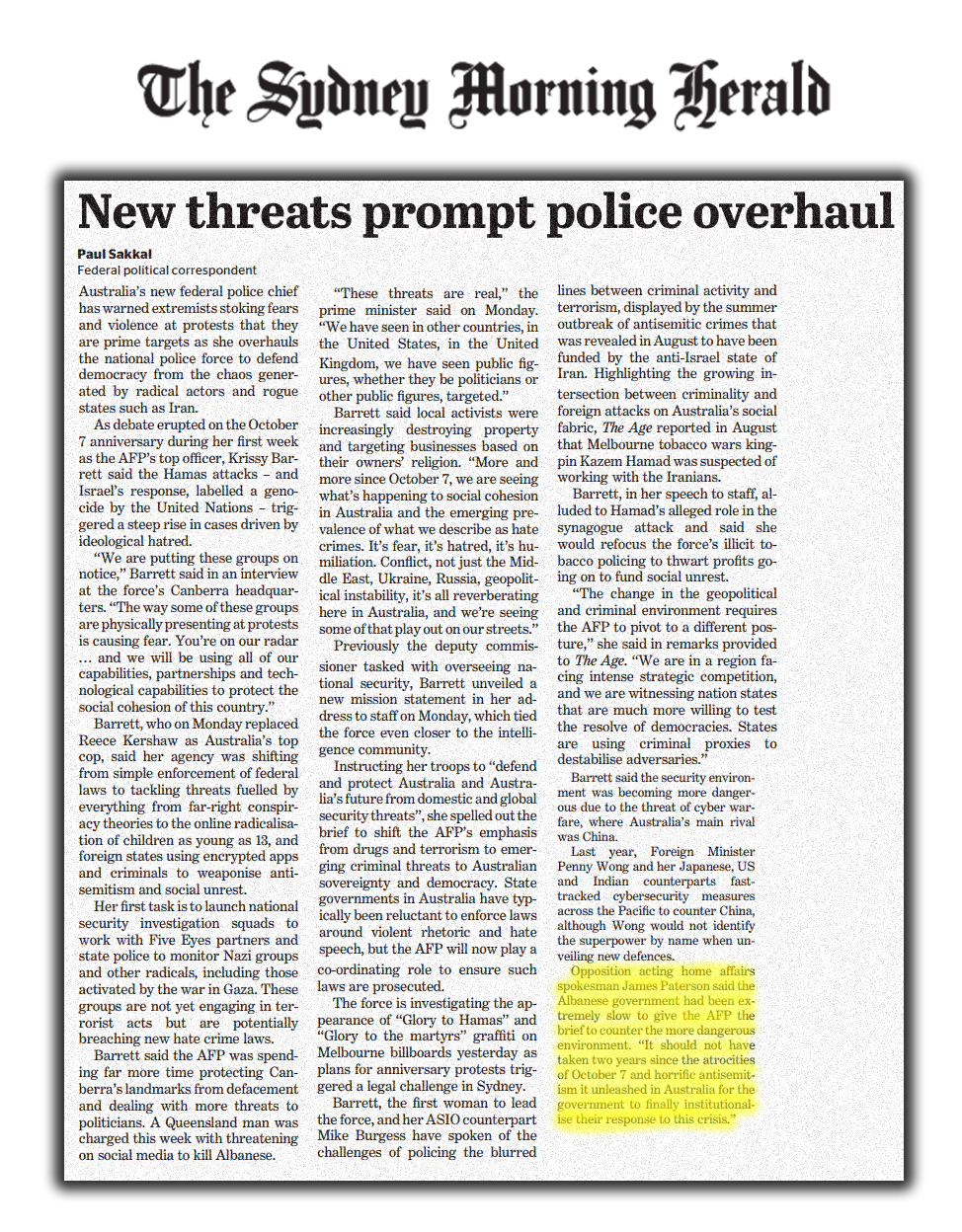Media
|
News
October 7, 2025

Australia's new federal police chief has warned extremists stoking fears and violence at protests that they are prime targets as she overhauls the national police force to defend democracy from the chaos generated by radical actors and rogue states such as Iran.
As debate erupted on the October 7 anniversary during her first week as the AFP's top officer, Krissy Barrett said the Hamas attacks and Israel's response, labelled a genocide by the United Nations triggered a steep rise in cases driven by ideological hatred.
''We are putting these groups on notice,'' Barrett said in an interview at the force's Canberra headquarters. ''The way some of these groups are physically presenting at protests is causing fear. You're on our radar ... and we will be using all of our capabilities, partnerships and technological capabilities to protect the social cohesion of this country.'' Barrett, who on Monday replaced Reece Kershaw as Australia's top cop, said her agency was shifting from simple enforcement of federal laws to tackling threats fuelled by everything from far-right conspiracy theories to the online radicalisation of children as young as 13, and foreign states using encrypted apps and criminals to weaponise antisemitism and social unrest.
Her first task is to launch national security investigation squads to work with Five Eyes partners and state police to monitor Nazi groups and other radicals, including those activated by the war in Gaza. These groups are not yet engaging in terrorist acts but are potentially breaching new hate crime laws.
Barrett said the AFP was spending far more time protecting Canberra's landmarks from defacement and dealing with more threats to politicians. A Queensland man was charged this week with threatening on social media to kill Albanese.
''These threats are real,'' the prime minister said on Monday. ''We have seen in other countries, in the United States, in the United Kingdom, we have seen public figures, whether they be politicians or other public figures, targeted.'' Barrett said local activists were increasingly destroying property and targeting businesses based on their owners' religion. ''More and more since October 7, we are seeing what's happening to social cohesion in Australia and the emerging prevalence of what we describe as hate crimes. It's fear, it's hatred, it's humiliation. Conflict, not just the Middle East, Ukraine, Russia, geopolitical instability, it's all reverberating here in Australia, and we're seeing some of that play out on our streets.'' Previously the deputy commissioner tasked with overseeing national security, Barrett unveiled a new mission statement in her address to staff on Monday, which tied the force even closer to the intelligence community.
Instructing her troops to ''defend and protect Australia and Australia's future from domestic and global security threats'', she spelled out the brief to shift the AFP's emphasis from drugs and terrorism to emerging criminal threats to Australian sovereignty and democracy. State governments in Australia have typically been reluctant to enforce laws around violent rhetoric and hate speech, but the AFP will now play a co-ordinating role to ensure such laws are prosecuted.
The force is investigating the appearance of ''Glory to Hamas'' and ''Glory to the martyrs'' graffiti on Melbourne billboards yesterday as plans for anniversary protests triggered a legal challenge in Sydney.
Barrett, the first woman to lead the force, and her ASIO counterpart Mike Burgess have spoken of the challenges of policing the blurred lines between criminal activity and terrorism, displayed by the summer outbreak of antisemitic crimes that was revealed in August to have been funded by the anti-Israel state of Iran. Highlighting the growing intersection between criminality and foreign attacks on Australia's social fabric, The Age reported in August that Melbourne tobacco wars kingpin Kazem Hamad was suspected of working with the Iranians.
Barrett, in her speech to staff, alluded to Hamad's alleged role in the synagogue attack and said she would refocus the force's illicit tobacco policing to thwart profits going on to fund social unrest.
''The change in the geopolitical and criminal environment requires the AFP to pivot to a different posture,'' she said in remarks provided to The Age. ''We are in a region facing intense strategic competition, and we are witnessing nation states that are much more willing to test the resolve of democracies. States are using criminal proxies to destabilise adversaries.'' Barrett said the security environment was becoming more dangerous due to the threat of cyber warfare, where Australia's main rival was China.
Last year, Foreign Minister Penny Wong and her Japanese, US and Indian counterparts fasttracked cybersecurity measures across the Pacific to counter China, although Wong would not identify the superpower by name when unveiling new defences.
Opposition acting home affairs spokesman James Paterson said the Albanese government had been extremely slow to give the AFP the brief to counter the more dangerous environment. ''It should not have taken two years since the atrocities of October 7 and horrific antisemitism it unleashed in Australia for the government to finally institutionalise their response to this crisis.''
'Conflict ... geopolitical instability, it's all reverberating here in Australia.' Krissy Barrett, AFP commissioner